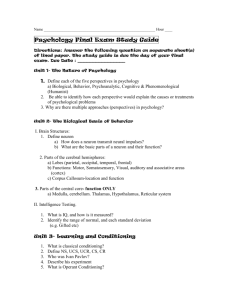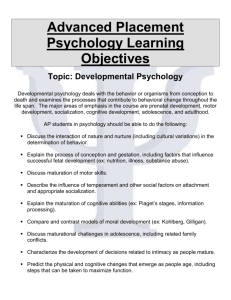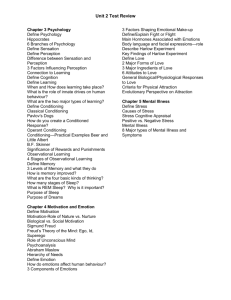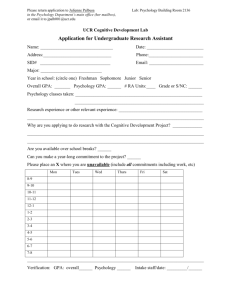Defining Psychology
advertisement
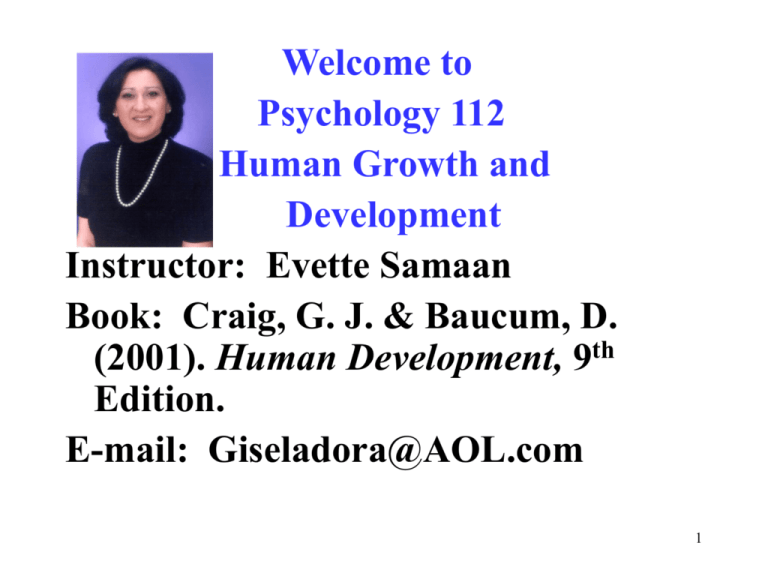
Welcome to Psychology 112 Human Growth and Development Instructor: Evette Samaan Book: Craig, G. J. & Baucum, D. (2001). Human Development, 9th Edition. E-mail: Giseladora@AOL.com 1 History of Psychology • Psychology is a fairly new science. • Until the 19th century it was not recognized as a separate field of study. • The birth of psychology as a formal science can be traced back to 1879. • It was founded by Wilhelm Wundt in Leipzig, Germany. • The use of introspection 2 Defining Psychology • Psychology is the scientific study of behavior and mental processes and how they are affected by an organism’s physical state, mental state, and external environment. 3 What Mom Knows • 4 years of age – Mommy can do any thing! • 8 years of age – My mom knows a lot! • 12 years of age – My mother doesn’t really know quite everything! • 14 years of age – Naturally, Mother doesn’t know that either! • 16 years of age – Mother? She’s hopelessly old-fashioned! 4 What Mom Knows • 18 years of age – That old woman? She’s way out of date! • 25 years of age – Well, she might know a little bit about it! • 35 years of age – Before we decide, let’s get Mom’s opinion! • 45 years of age – Wonder what Mom would have thought about it! • 65 years of age – Wish I could talk it over with Mom! 5 Defining Lifespan Psychology • Lifespan psychology is the field of study that examines patterns of growth, change, and stability in behavior that occur throughout the entire life span. 6 Age Groups in the Lifespan • Prenatal • Infancy (0-2) • Early Childhood (36 years) • Middle Childhood (6-11) • Adolescence (1219) • Early Adulthood (20-30’s) • Middle Adulthood (35-45) • Late Adulthood (60s-death) 7 What Constitutes a Good Theory • Provides a framework for unmanageable collections of information and then organizes around it, offering explanations • Provides testable predictions: – If we can predict with accuracy, we become more confident that we understand ourselves – Predictions give rise to further research that can refine or extend the theory. 8 Issues Relevant to Theories of Human Development 1- Active Versus Passive Development 2- Stages Verses Continuity in Development 9 1- Active Versus Passive Development 1- Organismic Theorists Emphasize active development. Argue that we are active participants in our own development 2- Mechanistic Theorists Emphasize passive development. We are driven primarily by our internal drives and motivations in conjunction with external pressures produced by the environment. 10 What Is the Best Answer? • Our active human minds interact with the forces of society and nature, and that interaction determines what we do and who we become. 11 2- Stages Versus Continuity in Development 1-Stages Development occurs “stepwise” in stages that are qualitatively different, so we achieve new ways of understanding our world quite abruptly. 2- Continuity Some changes are gradual and cumulative. 12 Lifespan Psychology Theoretical Perspectives • • • • • • 1- Psychodynamic Theories 2- Behavioral Perspective 3- Cognitive Perspective 4- Biological Approaches 5- Systems Approaches 6- Humanistic Approach 13 1-The Psychodynamic Theories (You Are What You Were) Freud Psychoanalysis a- The Structure of Personality b- Psychosexual Stages c- Defense Mechanisms 14 Freud, Psychoanalysis 15 Structure of Personality • Id: • Pleasure principle • Life & death instincts • Immediate gratification • Ego • Reality Principle • Superego • Ego Ideal: moral and social standards • Conscience: the inner voice 16 Structure of Personality 17 Psychosexual Stages • 1- Oral Stage (0-2) • 2- Anal Stage (2-3) • 3- The Phallic Stage (3-6) • 4- The Latency Stage (6-12) • 5- The Genital Stage (12-18) 18 Examine the life of a rapist in light of Freud’s Psychosexual stages and structure of personality. • • • • • • • What happened during each stage? Was he fixated at any stage? What principle does he operate by? What structure of personality is dominant? What is his famous sentence? Describe him in one word. Is there a balance between the function of the id and the superego? Why? 19 Defense Mechanisms • • • • • • • 1- Repression 2- Projection 3- Displacement 4- Regression 5- Denial 6- Sublimation 7- Reaction Formation 20 • Describe the condition this person is in, in terms of: – – – – Defense mechanisms The condition he/she is in Whether he/she is liberated Whether he/she has a clear understanding of the concept of salvation and the new birth in Christ 21 I Like It Here They told me on the other side Of the raging River of Change, There is nowhere to hide. But it sounds a bit strange, Here my feelings are inside, My heart has a guarded gate, what’s in can’t go outside, And no one can investigate. 22 They told me on the other side Everything will seem clear, turning on the light inside Will make the dark disappear. But it is a long , long ride, No, thank you my dear, I need a place to hide. So, since I like it here, It’s here where I’ll reside. 23 Change, I truly don’t know, Why would I go to neverland Just that I may grow? Here I know where I stand, I know how things will go. Why must I leave my land Drop my act for a new show? Change is not drawing near, ’Cause I certainly like it here. 24 Erik Erikson (1909-1994) Psychosocial Stages 1- Trust vs. Mistrust (birth to 1 ½) 2- Autonomy vs. Shame & Doubt (1 ½ -3) 3- Initiative vs. Guilt (3-6) 4- Competence vs. Inferiority (6-12) 5- Identity vs. role confusion (12-18) 6- Intimacy vs. Isolation (young adulthood) 7- Generativity vs. Stagnation (middle adulthood) 8- Ego Integrity vs. Despair (older adulthood) 25 Freud Erikson Psychosexual stages 5 stages of development Sexual motivation Psychosocial stages 8 developmental stages Psychological and social motivation At each stage there is a crisis that must be resolved Development is an ongoing process If issues aren’t resolved, fixation occurs End: sexually mature adult (adolescence) 26 • What happened to these people? In which stage did the crisis occur? Someone who is insecure Someone with low self-esteem Someone with an inferiority complex Someone who’s shy Someone who is insecure about his sexual orientation Someone who has difficulty establishing healthy relationships Someone with a midlife crisis Someone who’s terrified of death 27 2- Behaviorism and Learning Theories 1- Classical Conditioning 2- Operant Conditioning 3- Law of Effect 4- Social-Learning Theory Ivan Pavlov B.F. Skinner Thorndike A. Bandura J. Rotter Tolman 28 Behaviorism Classical Conditioning • Pavlov • The environmental impact on behavior • Classical Conditioning • Stimulus/Response 29 30 Classical Conditioning 31 Classical Conditioning in Real Life • Learning to like • Learning to fear • Accounting for Taste • Reacting to Medical Treatment 32 Operant Conditioning • The behavior is more likely or less likely to occur based on its consequences. • B. F. Skinner modified Pavlov’s concept. • Skinner used reinforcement and punishment to enhance learning. 33 Operant Conditioning Skinner 34 Behavioral Techniques Learning Conditioning Association between Environmental Stimuli + Response Classical Conditioning Association Stimulus-Response Operant Conditioning Reinforcement/ Punishment 35 Behaviorism Thorndike’s Law of Effect • Puzzle boxes and cats • Law of Effect A principle of learning theory stating that a behavior’s consequences determine the probability of its being repeated 36 The Social-Learning School (You Are What You Think & Observe) • 1- Locus of Control • Julian Rotter • 2- Self-efficacy • Albert Bandura • 3- Latent Learning • Edward Tolman 37 Julian Rotter Locus of Control • Internal (Internals) • External (Externals) • Tend to believe they are responsible for what happens to them • Tend to believe that they are victims of luck, fate, or others 38 Choose Your Locus of Control • 1- a. Many of the unhappy situations are partly due to bad luck. b. People’s misfortunes result from mistakes they make. • 2- a. Becoming a success is a matter of hard work; luck has little or nothing to do with it. b. Getting a job depends mainly on being in the right place at the right time. 39 Reciprocal Determinism in Locus of Control • Expectations Affect • What happens (environment & behavior) • What happens Affect • Expectations 40 Albert Bandura • • • • Self-efficacy Is Derived from: Experiences in mastering new skills Vicarious experiences provided by successful people Encouragement and persuasion Physiological and emotional state 41 Self-efficacy 42 Reciprocal Determinism in Self-efficacy • Belief in your abilities Affects • What happens to you (Behavior & environment) • What happens to you Affects • Your belief in your abilities 43 Social-Cognitive School Julian Rotter A. Bandura (1966, 82, 90) (1994, 1995) E. Tolman (1938) External/Internal Self-efficacy Locus of control Latent Learning Generalized Ex- Observation pectancies Imitation Cognitive Map Reciprocal Determinism Insight Reciprocal Determinism 44 • Which comes first, the biology or the belief? 45 Biology Belief • Genesists • Social Cognitive Theory • You will be disposed to seek out situations that let you express your biologically influenced trait. • You will seek situations in which you believe you can behave a certain way. • You are an active person then you play sports • You believe you’re good in sports then you play sports 46 3- The Cognitive Perspective Piaget Cognitive Development Vygotski Social-Cognitive Information Processing Theory 47 Piaget Constructivism Children think and learn in ways different from adults. They process information in quantity and quality All that we know of reality is based on our mental constructions or ideas We don’t passively discover ready-made knowledge, we actively construct knowledge 48 Piaget 1- Knowledge = motor behavior 2- Universal stages in a fixed order 3- Qualitative and quantitative acquisition of knowledge 4- Mental Structures or schemes 5- Two Principles: Assimilation Accommodation 49 Piaget Mental functioning Assimilation What you do when you fit new information into your present system of knowledge or mental schemas (categories of things and people) Accommodation Changing and modifying your new schemas 50 Piaget’s Cognitive Stages of Development • 1- Sensorimotor Stage • 2- Preoperational Stage • 3- Concrete Operations • 4- Formal Operations 51 Vygotski Social-Cognitive Theory We understand the world only by learning the shared meanings of others around us. Guided participation enables us to understand more and more about the world. 2 Levels of Cognitive Development a. The child’s actual developmental level b. The child level of potential development 52 Vygotski Zone of Proximal Development • The distance between what a child can do alone and what a child can do with the help of others • Children develop through participation in activities slightly beyond their competence with the help of adults or older children 53 Information-Processing Theory • A theory of human development that uses the computer as an analogy for the way the human mind receives, analyzes, and stores information 54 Information-Processing Theory • Encoding • Recorded in memory (Keyboard) • Storage • Saved in memory (on hard drive) • Retrieved • Brought into awareness (on screen) 55 4- The Biological Perspective (You Are What You’re Born) 1- Ethology 2- Evolutionary Psychology 3- Developmental Neuroscience 56 Ethological Theories Konrad Lorenz • Behavior is influenced by biology. • Imprinting is the rapid, innate learning within a limited period of time that involves attachment to the first moving object. • Critical period is a very early period in development in which certain behaviors optimally occur. 57 58 Evolutionary Psychology E. O. Wilson Inclusive Fitness Survival of the fittest comes in two ways 1- Direct Fitness The survival of the individual long enough to pass adaptive characteristics to the next generation 2- Indirect Fitness Biological relatedness, parents and children, etc. 59 Evolutionary Psychology • Dates back to Darwin and The Origin of Species and was extensive in the writings of the ethologists • Evolution: The process through which species change across generations • Pinker noted that it is a blend of cognitive psychology and evolutionary biology with emphasis on the human mind as an organ that has evolved like any other. 60 Developmental Neuroscience The study of the development of brain structures and the relations between brain structures and functions and behavior 61 5- Systems Approaches • • How systems evolve and change The family is a complex interacting system in which each member influences each member with regard to functioning and development. a. Contextualism b. Ecological Systems Theories 62 Ecological Approach 4 levels of environment that simultaneously influence individuals • 1- Microsystem • 2- Mesosystem • 3- Exsosystem • 4- Macrosystem 63 Contextualism The view that environmental, social, psychological, and historical factors interact to determine development 64 6- The Humanist & Existentialist Theories • Abraham Maslow (19081970) • Carl Rogers (1902-1987) • Rollo May (1909-1994) 65 Abraham Maslow • Hierarchy of Needs 1- Safety & Physiological Needs 2- Emotional & Psychological Needs 3- Self-acctulization 66 67 Carl Rogers • Congruence – Relationship between self and organism • Unconditional Positive Regard • Self-fulfillment 68 Congruence Self = Organism Self Organism Your conscious view of yourself The way you want to be based on peer, parental, and societal pressures Sum of all of your experiences Who we really are Others and the environment give us feedback on who we really are 69 Existentialism Rollo May • Difficult and Tragic Aspects of the Human Condition • Freedom of Choice • Absence of any obvious meaning or sense to life 70 Which Approach is Right? Consider the behavior of an alcoholic person. • • • • • What led to this lifestyle? What are the factors to be considered? Biological cultural Social/family cognitive Emotions personality 71 Song The Greatest Love of All I believe the children are our future; Teach them well and let them lead the way. Show them all the beauty they possess inside. Give them a sense of pride to make it easier; Let the children’s laughter remind us how we used to be. 72 Everybody is looking for a hero; People need someone to look up to. I never found anyone who fulfilled my needs; A lonely place to be And so I learned to depend on me. I decided long ago Never to walk in anyone’s shadow. is happening to me. 73 If I fail, if I succeed, At least I lived as I believe. No matter what they take from me, They can’t take away my dignity; Because the greatest love of all Is happening to me I found the greatest love of all inside of me. The greatest love of all is easy to achieve. Learning to love yourself Is the greatest love of all. 74 What theory does the song represent? • • • • • • • Is she self-actualized? Did she have unconditional positive regard? Where her psychological needs met? What did she do with her free will? What is her locus of control? Describe her self-efficacy now. Is she on her way to self-actualization, or she is stuck somewhere in the hierarchy of needs? 75 Who or Which Theory would most likely State the Following Statements Choose from the following: Freud, Wilhelm Wundt, Psychodynamic psychologist, Jean Piaget, Carl Rogers, Abraham Maslow, Bandura, Rotter, Lorenz, existentialism, humanism, ecological, Erikson, Skinner, Pavlov, social-learning, Thorndike 76 1- My theory emphasizes the unconscious dynamics within the individual. 2- I reject that behavior is determined by unconscious dynamics or the environment. 3- I say that people have freedom of choice, but this freedom entails anxiety. 4- I believe that people can reach their full potential when treated with unconditional positive regard. 5- I would like to call my psychology the “third force.” 6- My psychology compares the human brain to a computer. 7- I believe that fully functioning people show congruence or harmony between self and organism. 8- According to me, sexuality is very important in development. 9- I believe that people develop over the life span in 8 stages 77 10-I talk about the hierarchy of needs. 11-I talk about imprinting. 12-People learn by observation and insight. 13-I talk about the locus of control. 14-I talk about the reciprocal determinism in selfefficacy. 15-I believe that the structure of personality consists of the id, ego, and superego. 16-There are 4 levels of the environment: microsystem, mesosystem, exosystem, and macrosystem. 17-The study of the relations between brain structures and functions and behavior. 18-I established the first psychological lab. 78 19-I talk about the law of effect. 20-I coined the expression “classical conditioning.” 21-I coined the expression “operant conditioning.” 22-Learning occurs in the environment in which stimuli elicit responses. 23-I experimented with dogs to measure the amount of saliva they produced when listening to the sound of a bell. 24-I talk about 4 stages of cognitive development. 25-Children acquire knowledge in a quantitative as well as qualitative manner. 79

